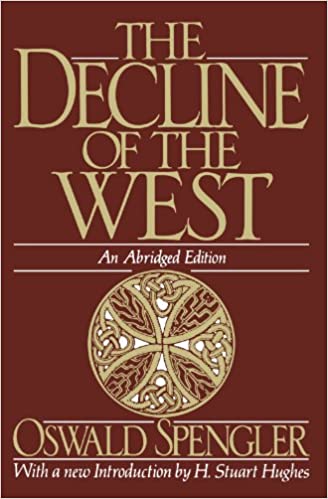English kalba
The Decline of the West
The Decline of the West (German: Der Untergang des Abendlandes), or more literally, The Downfall of the Occident, is a two-volume work by Oswald Spengler. The first volume, subtitled Form and Actuality, was published in the summer of 1918. The second volume, subtitled Perspectives of World History, was published in 1922. The definitive edition of both volumes was published in 1923.Spengler introduces his book as a "Copernican overturning"—a specific metaphor of societal collapse—involving the rejection of the Eurocentric view of history, especially the division of history into the linear "ancient-medieval-modern" rubric. According to Spengler, the meaningful units for history are not epochs but whole cultures which evolve as organisms. He recognizes at least eight high cultures: Babylonian, Egyptian, Chinese, Indian, Mesoamerican (Mayan/Aztec), Classical (Greek/Roman), Arabian, and Western or European. Cultures have a lifespan of about a thousand years of flourishing, and a thousand years of decline. The final stage of …
The Decline of the West (German: Der Untergang des Abendlandes), or more literally, The Downfall of the Occident, is a two-volume work by Oswald Spengler. The first volume, subtitled Form and Actuality, was published in the summer of 1918. The second volume, subtitled Perspectives of World History, was published in 1922. The definitive edition of both volumes was published in 1923.Spengler introduces his book as a "Copernican overturning"—a specific metaphor of societal collapse—involving the rejection of the Eurocentric view of history, especially the division of history into the linear "ancient-medieval-modern" rubric. According to Spengler, the meaningful units for history are not epochs but whole cultures which evolve as organisms. He recognizes at least eight high cultures: Babylonian, Egyptian, Chinese, Indian, Mesoamerican (Mayan/Aztec), Classical (Greek/Roman), Arabian, and Western or European. Cultures have a lifespan of about a thousand years of flourishing, and a thousand years of decline. The final stage of each culture is, in his word use, a "civilization". Spengler also presents the idea of Muslims, Jews and Christians, as well as their Persian and Semitic forebears, being "Magian"; Mediterranean cultures of antiquity such as Ancient Greece and Rome being "Apollonian"; and modern Westerners being "Faustian". According to Spengler, the Western world is ending and we are witnessing the final season, the "winter" of Faustian Civilization. In Spengler's depiction, Western Man is a proud but tragic figure because, while he strives and creates, he secretly knows the actual goal will never be reached.
